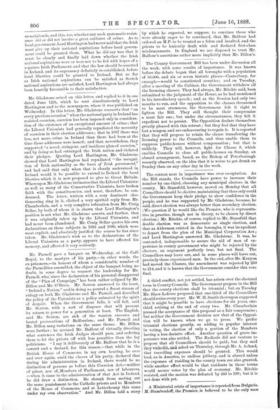The contest next in importance was over co-optation. As the
Bill stands, the Councils have power to increase their number by one-third, choosing any municipal electors in the county. Mr. Stansfeld, however, moved on Monday that all Councillors should be elective, maintaining that thus only could the Government keep their pledge to show confidence in the people, and he was supported by Mr. Gladstone, because, he said, direct election was always better than secondary election. (We question if he would like the Premier, who is representa- tive in practice, though not in theory, to be chosen by direct election.) Mr. Ritchie, of course, replied to Mr. Stansfeld that double election was as democratic as single election, and that as Aldermen existed in the boroughs, it was inexpedient to depart from the plan of the Municipal Corporation Act ; and Lord Hartington answered Mr. Gladstone. It was, he contended, indispensable to secure the aid of men of ex- perience in county government who might be rejected by the electors, an argument perfectly true, but not final. The Councillors may leave out, and in some places will leave out, precisely those experienced men. In the end, after Mr. Kenyon had moved the Closure, the amendment was rejected by 250 to 214, and it is known that the Government consider this vote final.


































 Previous page
Previous page